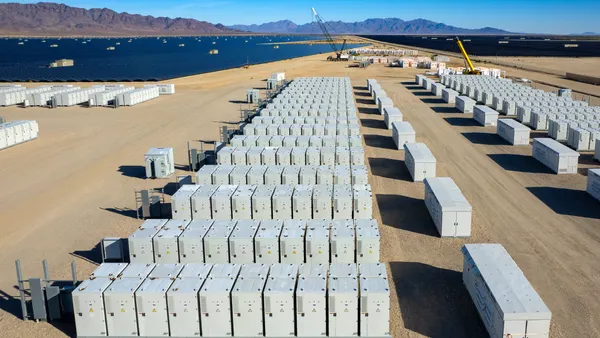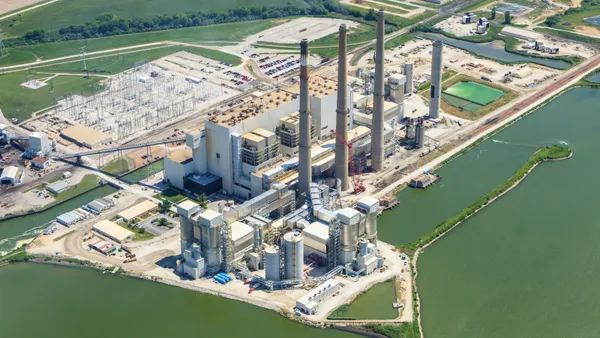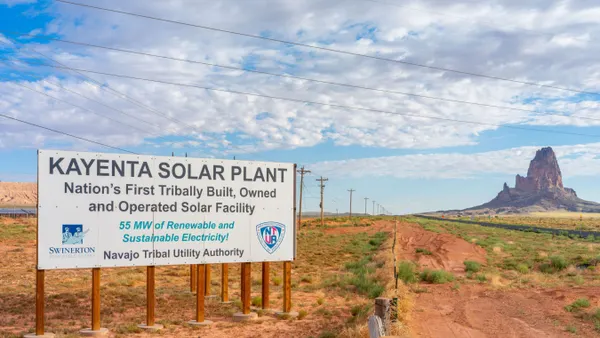Dive Brief:
- The chairman of the Federal Energy Regulatory Commission praised the Secretary of Energy on Tuesday, despite FERC unanimously rejecting a DOE coal and nuclear subsidy package last month.
- Chairman Kevin McIntyre told a conference of state utility regulators in Washington that while the commission rejected Secretary Rick Perry's proposed grid resilience rule on "technical legal grounds," he is a "big fan" of the secretary and the two agencies enjoy a "wonderful working relationship."
- The wide-ranging address also touched on FERC's plans to reform the Public Utility Regulatory Policy Act (PURPA), review pipeline siting policy and adapt to tax reform. McIntyre additionally noted that FERC will issue an order on Thursday addressing compensation for distributed energy resources and energy storage in wholesale power markets.
Dive Insight:
When FERC last month unanimously rejected the Department of Energy's grid resilience rule, it handed Secretary Perry his first big loss of the Trump administration.
Perry proposed the grid rule in September using a seldom-deployed section of the Federal Power Act that allows the DOE to initiate rulemakings at FERC. The plan aimed to provide cost recovery to merchant power plants with 90 days of fuel supply and was widely viewed in the power sector as a vehicle to lend financial support to struggling coal and nuclear generators.
FERC rejected the plan 5-0 in January, writing that DOE had not proven that current market rules are unreasonable, nor that their proposed cost recovery solution "would not be unduly discriminatory or preferential."
McIntyre notably did not address the specifics of that argument in his Tuesday address before the National Association of Regulatory Utility Commissioners (NARUC), a group of state utility regulators. Instead, he said FERC was obligated to reject the plan for "technical legal" reasons.
"For grounds that essentially boil down to technical, legal grounds we found that we as the FERC were unable to accept the [proposal] in the form it was provided to us," he said, "technical legal grounds pertaining to Section 206 of the Federal Power Act" — the section of the law that prohibits discriminatory or preferential ratemaking.
Despite the decision, McIntyre told the state regulators that FERC and DOE continue to have an "excellent working relationship" that he would like to see grow.
"I can't talk about this without acknowledging that I'm just a very big fan of Secretary of Energy Rick Perry," he said. "He's a true public servant and he has absolutely hit the ground running in his role there at DOE so I salute him for that."
Pipeline review
McIntyre's NARUC speech also touched on his plans for FERC's first review of its pipeline approval policies since 1999, announced at McIntyre's first Open Meeting in December.
While he did not release a timeline for the review, the chairman said the pipeline review will include at least two focus areas: pipeline need and environmental impacts.
Today, FERC judges pipeline need by precedent agreements — contracts for pipeline capacity signed before the project is built. Two Democratic members of the commission have called that practice into question, arguing FERC may need to consider if those contracts are coming from affiliates of the pipeline builder.
"Should it matter whether some of the entities signing up for precedent agreements are affiliated with or perhaps even owned outright by the pipeline applicant?" McIntyre asked rhetorically. "There are still independent market participants, but is that enough? Should the regulator look askance at that situation and say that doesn't seem like a valid, arms-length measure of pipeline need? That's something we'll have to take a look at."
McIntyre also noted litigation at the D.C. Circuit Court of Appeals concerning FERC's accounting of climate impacts of pipelines. The court this month reiterated an August decision throwing out that accounting for the Sabal Trail pipeline in Florida, sparking a mad dash to save the pipeline from temporary shutdown.
Those issues will also play into the pipeline review, McIntyre said.
"We have an obligation to ensure an appropriate consideration of the impact of greenhouse gases that are presented by a given pipeline application," McIntyre said. "How should that be measured? Are we talking about simply greenhouse gas issues raised by the flow of gas through the specific stretch of pipe that's proposed to be constructed or should we be looking downstream to what may happen to the natural gas when it reaches its market?"
PURPA reform
The FERC chairman also addressed concerns about PURPA, which obligates utilities to purchase power from certain qualifying facilities, usually small renewable energy generators.
A number of utilities argue that renewable energy developers can "game" size requirements for PURPA by slicing larger projects into smaller parts. Many also complain that the avoided cost calculations that determine resources for PURPA compensation are out of date.
Both those issues will be on the table when FERC takes up the issue, McIntyre said.
"The PURPA calculation of the avoided cost level ... that is still a very old-fashioned process determined administratively state-by-state in coordination between the state regulator and the affected utilities," McIntyre said. "Should that be reformed? i know there's a strong feeling among many stakeholders that it should be."













